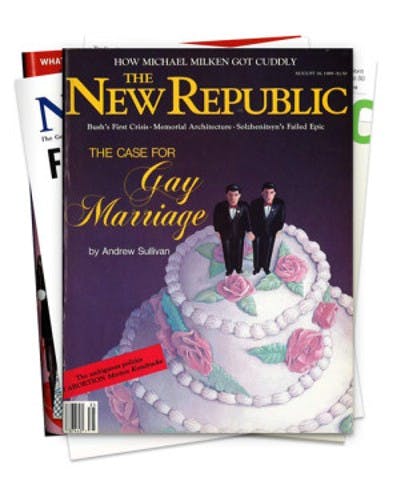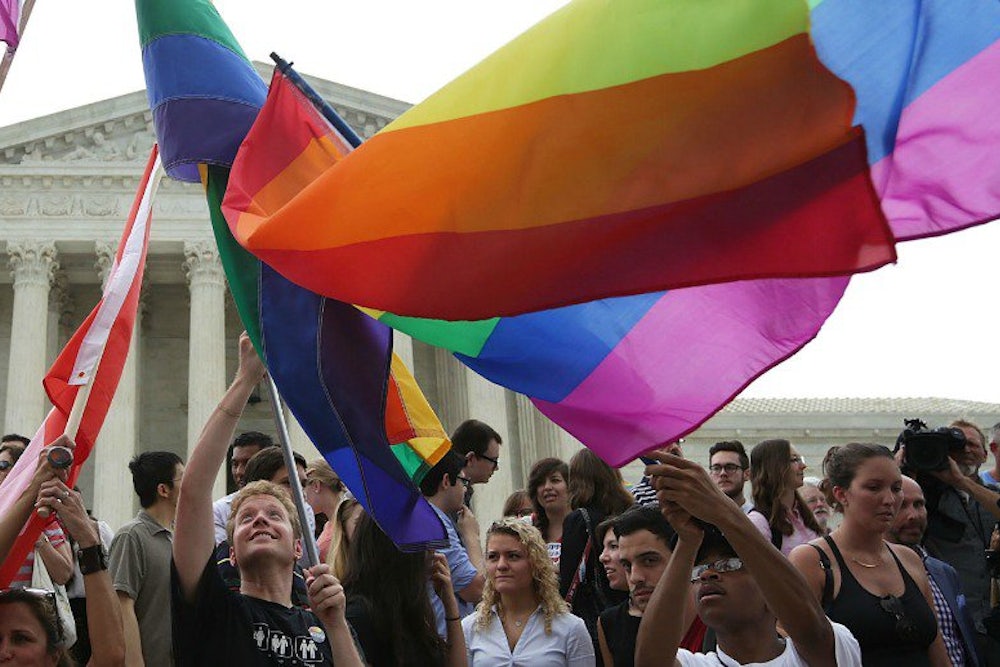As Gandhi never quite said,
First they ignore you. Then they laugh at you. Then they attack you. Then you win.
I remember one of the first TV debates I had on the then-strange question of civil marriage for gay couples. It was Crossfire, as I recall, and Gary Bauer’s response to my rather earnest argument after my TNR cover-story on the matter was laughter. “This is the loopiest idea ever to come down the pike,” he joked. “Why are we even discussing it?”
Those were isolating days. A young fellow named Evan Wolfson who had written a dissertation on the subject in 1983 got in touch, and the world immediately felt less lonely. Then a breakthrough in Hawaii, where the state supreme court ruled for marriage equality on gender equality grounds. No gay group had agreed to support the case, which was regarded at best as hopeless and at worst, a recipe for a massive backlash. A local straight attorney from the ACLU, Dan Foley, took it up instead, one of many straight men and women who helped make this happen. And when we won, and got our first fact on the ground, we indeed faced exactly that backlash and all the major gay rights groups refused to spend a dime on protecting the breakthrough … and we lost.

In fact, we lost and lost and lost again. Much of the gay left was deeply suspicious of this conservative-sounding reform; two thirds of the country were opposed; the religious right saw in the issue a unique opportunity for political leverage—and over time, they put state constitutional amendments against marriage equality on the ballot in countless states, and won every time. Our allies deserted us. The Clintons embraced the Defense of Marriage Act, and their Justice Department declared that DOMA was in no way unconstitutional the morning some of us were testifying against it on Capitol Hill. For his part, president George W. Bush subsequently went even further and embraced the Federal Marriage Amendment to permanently ensure second-class citizenship for gay people in America. Those were dark, dark days.
I recall all this now simply to rebut the entire line of being “on the right side of history.” History does not have such straight lines. Movements do not move relentlessly forward; progress comes and, just as swiftly, goes. For many years, it felt like one step forward, two steps back. History is a miasma of contingency, and courage, and conviction, and chance.
But some things you know deep in your heart: that all human beings are made in the image of God; that their loves and lives are equally precious; that the pursuit of happiness promised in the Declaration of Independence has no meaning if it does not include the right to marry the person you love; and has no force if it denies that fundamental human freedom to a portion of its citizens. In the words of Hannah Arendt:
“The right to marry whoever one wishes is an elementary human right compared to which ‘the right to attend an integrated school, the right to sit where one pleases on a bus, the right to go into any hotel or recreation area or place of amusement, regardless of one’s skin or color or race’ are minor indeed. Even political rights, like the right to vote, and nearly all other rights enumerated in the Constitution, are secondary to the inalienable human rights to ‘life, liberty and the pursuit of happiness’ proclaimed in the Declaration of Independence; and to this category the right to home and marriage unquestionably belongs.”
This core truth is what Justice Kennedy affirmed today, for the majority: that gay people are human. I wrote the following in 1996:
Homosexuality, at its core, is about the emotional connection between two adult human beings. And what public institution is more central—more definitive—of that connection than marriage? The denial of marriage to gay people is therefore not a minor issue. It is the entire issue. It is the most profound statement our society can make that homosexual love is simply not as good as heterosexual love; that gay lives and commitments and hopes are simply worth less. It cuts gay people off not merely from civic respect, but from the rituals and history of their own families and friends. It erases them not merely as citizens, but as human beings.
We are not disordered or sick or defective or evil—at least no more than our fellow humans in this vale of tears. We are born into family; we love; we marry; we take care of our children; we die. No civil institution is related to these deep human experiences more than civil marriage and the exclusion of gay people from this institution was a statement of our core inferiority not just as citizens but as human beings. It took courage to embrace this fact the way the Supreme Court did today. In that 1996 essay, I analogized to the slow end to the state bans on inter-racial marriage:
The process of integration—like today’s process of “coming out”—introduced the minority to the majority, and humanized them. Slowly, white people came to look at interracial couples and see love rather than sex, stability rather than breakdown. And black people came to see interracial couples not as a threat to their identity, but as a symbol of their humanity behind the falsifying carapace of race.
It could happen again. But it is not inevitable; and it won’t happen by itself. And, maybe sooner rather than later, the people who insist upon the centrality of gay marriage to every American’s equality will come to seem less marginal, or troublemaking, or “cultural,” or bent on ghettoizing themselves. They will seem merely like people who have been allowed to see the possibility of a larger human dignity and who cannot wait to achieve it.
I think of the gay kids in the future who, when they figure out they are different, will never know the deep psychic wound my generation—and every one before mine—lived through: the pain of knowing they could never be fully part of their own family, never befully a citizen of their own country. I think, more acutely, of the decades and centuries of human shame and darkness and waste and terror that defined gay people’s lives for so long. And I think of all those who supported this movement who never lived to see this day., who died in the ashes from which this phoenix of a movement emerged. This momentous achievement is their victory too—for marriage, as Kennedy argued, endures past death.
I never believed this would happen in my lifetime when I wrote my first several TNR essays and then my book, Virtually Normal, and then the anthology and the hundreds and hundreds of talks and lectures and talk-shows and call-ins and blog-posts and articles in the 1990s and 2000s. I thought the book, at least, would be something I would have to leave behind me—secure in the knowledge that its arguments were, in fact, logically irrefutable, and would endure past my own death, at least somewhere. I never for a millisecond thought I would live to be married myself. Or that it would be possible for everyone, everyone in America.
But it has come to pass. All of it. In one fell, final swoop.
